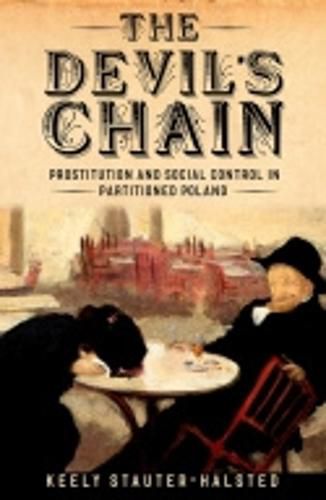Readings Newsletter
Become a Readings Member to make your shopping experience even easier.
Sign in or sign up for free!
You’re not far away from qualifying for FREE standard shipping within Australia
You’ve qualified for FREE standard shipping within Australia
The cart is loading…






In the half-century before Poland’s long-awaited political independence in 1918, anxiety surrounding the country’s burgeoning sex industry fueled nearly constant public debate. The Devil’s Chain is the first book to examine the world of commercial sex throughout the partitioned Polish territories, uncovering a previously hidden conversation about sexuality, gender propriety, and social class. Keely Stauter-Halsted situates the preoccupation with prostitution in the context of Poland’s struggle for political independence and its difficult transition to modernity. She traces the Poles’ growing anxiety about white slavery, venereal disease, and eugenics by examining the regulation of the female body, the rise of medical authority, and the role of social reformers in addressing the problem of paid sex. Stauter-Halsted argues that the sale of sex was positioned at the juncture of mass and elite cultures, affecting nearly every aspect of urban life and bringing together sharply divergent social classes in what had long been a radically stratified society. She captures the experiences of the impoverished women who turned to the streets and draws a vivid picture of the social milieu that shaped their choices. The Devil’s Chain demonstrates that discussions of prostitution and its attendant disorders-sexual deviancy, alcoholism, child abuse, vagrancy, and other related problems-reflected differing visions for the future of the Polish nation.
$9.00 standard shipping within Australia
FREE standard shipping within Australia for orders over $100.00
Express & International shipping calculated at checkout
In the half-century before Poland’s long-awaited political independence in 1918, anxiety surrounding the country’s burgeoning sex industry fueled nearly constant public debate. The Devil’s Chain is the first book to examine the world of commercial sex throughout the partitioned Polish territories, uncovering a previously hidden conversation about sexuality, gender propriety, and social class. Keely Stauter-Halsted situates the preoccupation with prostitution in the context of Poland’s struggle for political independence and its difficult transition to modernity. She traces the Poles’ growing anxiety about white slavery, venereal disease, and eugenics by examining the regulation of the female body, the rise of medical authority, and the role of social reformers in addressing the problem of paid sex. Stauter-Halsted argues that the sale of sex was positioned at the juncture of mass and elite cultures, affecting nearly every aspect of urban life and bringing together sharply divergent social classes in what had long been a radically stratified society. She captures the experiences of the impoverished women who turned to the streets and draws a vivid picture of the social milieu that shaped their choices. The Devil’s Chain demonstrates that discussions of prostitution and its attendant disorders-sexual deviancy, alcoholism, child abuse, vagrancy, and other related problems-reflected differing visions for the future of the Polish nation.